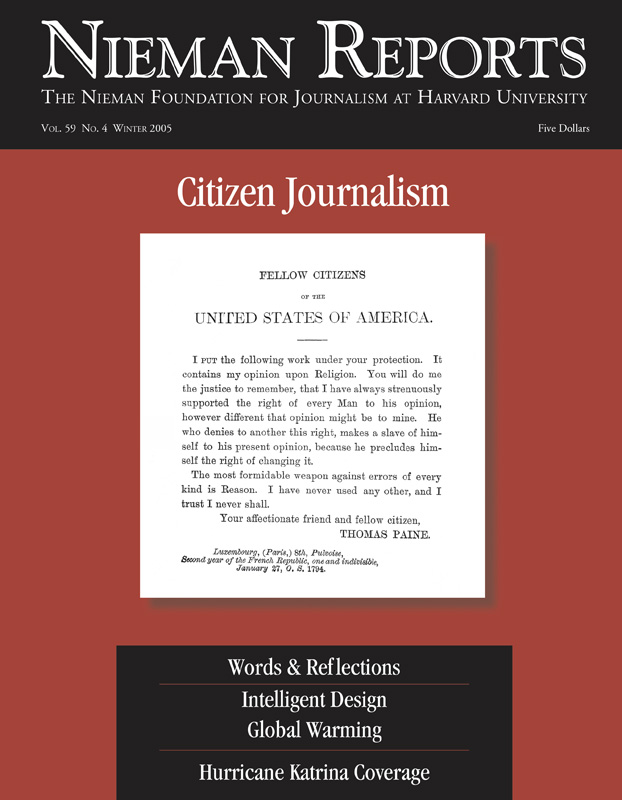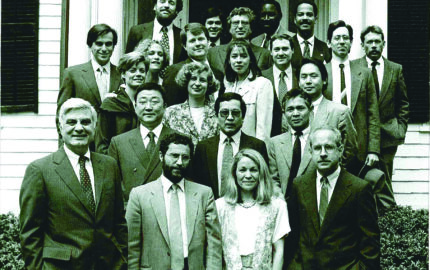The world is going through a cyclical period of high interest in global health. Avian flu is on everyone’s mind now, with building anxiety about whether this deadly respiratory virus might spread across the planet and become a pandemic among humans. Two years ago the subject was SARS, and previously such illnesses as HIV/AIDS have been the subjects of intense public interest that lose their urgency before long.
The recent Time magazine Global Health Summit brought together an extraordinary gathering of practitioners, researchers, scholars, public officials, activists and journalists to discuss strategies for addressing global health issues. The magazine’s special issue on global health and the six-part television series on PBS explained the critical nature of global health to wide audiences. News reports from Africa about the poor populations affected by malaria and HIV/AIDS, and stories about international pressure on the Bush administration to commit the United States to paying a fair share of health costs in Africa, are giving the American public other reasons to pay attention, for now. But it is difficult to maintain continuing public attention among Americans and Europeans on global health; and people in the developing world, where the most serious health problems exist, have little access to accurate information.
To help educate journalists to cover these important stories, the Nieman Foundation has begun a pilot program to provide three annual Nieman Fellowships in global health reporting for three years under a $1.19 million grant from the Bill & Melinda Gates Foundation. The fellowships are a joint initiative with the Harvard School of Public Health. The Nieman Foundation worked closely with the school’s Center for Health Communication in writing the grant proposal. Jay A. Winsten, an associate dean and director of that center, was a true partner in persuading his faculty to enable the global health fellows to have access to courses throughout the school and work with advisors in course selection and in planning fieldwork projects. Particularly important to the fellows’ experience is the opportunity to connect with Harvard’s Initiative for Global Health, which was established in 2003 as a universitywide effort to bridge the gap from basic to applied life sciences, including social, economic, political and ethical issues that influence global health.
The global health reporting fellows—one from the United States, one from Europe, and one from the developing world—will be chosen annually, starting with the 2006-2007 academic year. The fellowships will include four months of fieldwork in a developing country at the end of the Nieman year at Harvard. Adding four months of fieldwork is an exciting innovation in the Nieman program. It emphasizes the value of sending fellows to places in the developing world where they can get closest to the problems of disease, prevention and potential treatments. At the end of the fieldwork, the fellows will be expected to produce stories that draw on their intense exposure to health conditions in a developing country.
The decision to select fellows from the United States, Europe and the developing world recognizes several important realities about global health. The United States and Europe are among the richest places in the world. Major resources for research and treatment exist there. It is critical for the public and policymakers in these countries to be better informed about the problems of global health. Including a journalist from a developing country recognizes the challenge of providing basic knowledge about health to populations at risk in Africa and other parts of the developing world, where local reporters typically are ill-equipped, and sometimes ill-informed, on these topics.
We expect the fellowships will attract an applicant pool both from journalists who have experience in reporting on public health and who represent news organizations with a commitment to continuing coverage of global health and from journalists with a strong interest in global health but little actual experience in reporting on it. Dedicating three of our 25 fellowships for each of the next three years to global health reporting reflects our belief that the resources of the Nieman Foundation and Harvard’s commitment to global health can contribute to building broader public understanding about illnesses that burden the world’s poorest people—and could potentially threaten the entire globe.
A recent editorial in The Lancet, a British scientific journal, said that “the eradication of disease and the alleviation of suffering depend more on developing the skills of talented people than on technology.”
In funding these Nieman Fellowships, the Gates Foundation is acknowledging the critical role journalism can play in informing worldwide audiences of the complex problems in global health and of the imperative for both effective public policies and for investment in research toward prevention and treatment.
The recent Time magazine Global Health Summit brought together an extraordinary gathering of practitioners, researchers, scholars, public officials, activists and journalists to discuss strategies for addressing global health issues. The magazine’s special issue on global health and the six-part television series on PBS explained the critical nature of global health to wide audiences. News reports from Africa about the poor populations affected by malaria and HIV/AIDS, and stories about international pressure on the Bush administration to commit the United States to paying a fair share of health costs in Africa, are giving the American public other reasons to pay attention, for now. But it is difficult to maintain continuing public attention among Americans and Europeans on global health; and people in the developing world, where the most serious health problems exist, have little access to accurate information.
To help educate journalists to cover these important stories, the Nieman Foundation has begun a pilot program to provide three annual Nieman Fellowships in global health reporting for three years under a $1.19 million grant from the Bill & Melinda Gates Foundation. The fellowships are a joint initiative with the Harvard School of Public Health. The Nieman Foundation worked closely with the school’s Center for Health Communication in writing the grant proposal. Jay A. Winsten, an associate dean and director of that center, was a true partner in persuading his faculty to enable the global health fellows to have access to courses throughout the school and work with advisors in course selection and in planning fieldwork projects. Particularly important to the fellows’ experience is the opportunity to connect with Harvard’s Initiative for Global Health, which was established in 2003 as a universitywide effort to bridge the gap from basic to applied life sciences, including social, economic, political and ethical issues that influence global health.
The global health reporting fellows—one from the United States, one from Europe, and one from the developing world—will be chosen annually, starting with the 2006-2007 academic year. The fellowships will include four months of fieldwork in a developing country at the end of the Nieman year at Harvard. Adding four months of fieldwork is an exciting innovation in the Nieman program. It emphasizes the value of sending fellows to places in the developing world where they can get closest to the problems of disease, prevention and potential treatments. At the end of the fieldwork, the fellows will be expected to produce stories that draw on their intense exposure to health conditions in a developing country.
The decision to select fellows from the United States, Europe and the developing world recognizes several important realities about global health. The United States and Europe are among the richest places in the world. Major resources for research and treatment exist there. It is critical for the public and policymakers in these countries to be better informed about the problems of global health. Including a journalist from a developing country recognizes the challenge of providing basic knowledge about health to populations at risk in Africa and other parts of the developing world, where local reporters typically are ill-equipped, and sometimes ill-informed, on these topics.
We expect the fellowships will attract an applicant pool both from journalists who have experience in reporting on public health and who represent news organizations with a commitment to continuing coverage of global health and from journalists with a strong interest in global health but little actual experience in reporting on it. Dedicating three of our 25 fellowships for each of the next three years to global health reporting reflects our belief that the resources of the Nieman Foundation and Harvard’s commitment to global health can contribute to building broader public understanding about illnesses that burden the world’s poorest people—and could potentially threaten the entire globe.
A recent editorial in The Lancet, a British scientific journal, said that “the eradication of disease and the alleviation of suffering depend more on developing the skills of talented people than on technology.”
In funding these Nieman Fellowships, the Gates Foundation is acknowledging the critical role journalism can play in informing worldwide audiences of the complex problems in global health and of the imperative for both effective public policies and for investment in research toward prevention and treatment.



